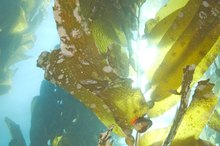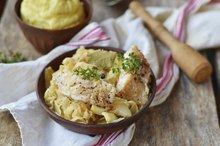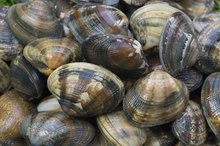Nutritional Value of Canned Clams
Clams can be purchased, fresh, frozen or canned, making them easily accessible year round 1. As a low-fat source of protein, clams can be added to pasta dishes, soups and stews to increase protein content and to add a dash of something different to your meal. Clams are a good source of a number of nutrients, including iron, vitamin B12 and vitamin C.
Calories, Protein and Fat
A 1-cup serving of drained clams, weighing 160 grams, contains 237 calories per serving. Of this, only 28 calories are from fat, as the serving contains 3 grams of total fat, making up less than 5 percent of your daily intake for a 2,000 calorie per day diet. However, this serving size of clams has 107 milligrams of cholesterol, which is more than a third of your daily value. The same size serving of drained clams also contains 41 grams of protein.
- A 1-cup serving of drained clams, weighing 160 grams, contains 237 calories per serving.
- Of this, only 28 calories are from fat, as the serving contains 3 grams of total fat, making up less than 5 percent of your daily intake for a 2,000 calorie per day diet.
Vitamins and Minerals
Vegetarian Substitutes for Cod Liver Oil
Learn More
A 1-cup serving of clams has 35.4 milligrams of vitamin C, which is 59 percent of your daily value for a 2,000 calorie per day diet. The same size serving also has 158 micrograms of vitamin B12, more than 100 percent of your daily value, and almost 1 milligram of riboflavin, a member of the vitamin B complex, nearly 40 percent of your suggested daily intake.
The same size serving of canned clams contains almost 250 percent of your daily iron requirement, with 44.7 milligrams per serving 1. It is also rich in phosphorus, with 541 milligrams, or 54 percent of your daily requirement, and potassium, with 1,005 milligrams per serving, which amounts to 29 percent of your daily needs.
- A 1-cup serving of clams has 35.4 milligrams of vitamin C, which is 59 percent of your daily value for a 2,000 calorie per day diet.
- The same size serving also has 158 micrograms of vitamin B12, more than 100 percent of your daily value, and almost 1 milligram of riboflavin, a member of the vitamin B complex, nearly 40 percent of your suggested daily intake.
Seafood Contaminants
The Environmental Defense Fund notes that clams cause little ecological damage in their harvest and production and are low in mercury and other contaminants, making them a safe seafood choice 23. The organization states that it is safe for all people to eat four or more servings of clams per week. While healthy and nutritious, some other fish and seafood options are high in toxic contaminants because of their living and growing conditions. Common contaminants include mercury, lead, pesticides such as DDT, and industrial chemicals.
- The Environmental Defense Fund notes that clams cause little ecological damage in their harvest and production and are low in mercury and other contaminants, making them a safe seafood choice 2.
Including Canned Clams in Your Diet
Rockfish Nutrition Facts
Learn More
Canned clams can be purchased from many grocery stores and are usually precooked 1. Simply drain the can and add the clams to sauces, soups or stews. A common clam-based dish is clam sauce, where clams are added to pasta sauce, or clam chowder. Clam pasta sauce can be a red, or tomato-based, or white. Add the canned clams at the end of the cooking to prevent them from overcooking 1. Canned clams are canned with sodium, so add salt after you have tasted the finished dish to avoid going overboard 1. A 1-cup serving of drained canned clams contains 179 milligrams of sodium, or 7 percent of your daily value 1.
Related Articles
References
- Nutrition Data: Clams, Canned
- Environmental Defense Fund: Clams
- Environmental Defense Fund: Common Questions About Contaminants in Seafood
Writer Bio
Marie Dannie has been a professional journalist since 1991, specializing in nutrition and health topics. She has written for "Woman’s Own," the "Daily Mail," the "Daily Mirror" and the "Telegraph." She is a registered nutritionist and holds a Bachelor of Science degree with honors in food science from the University of Nottingham.









